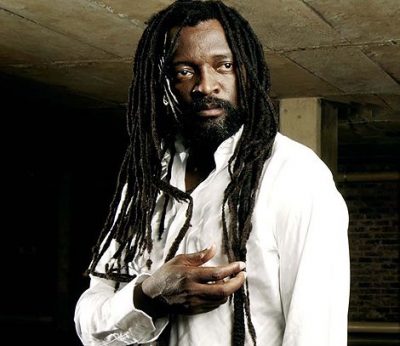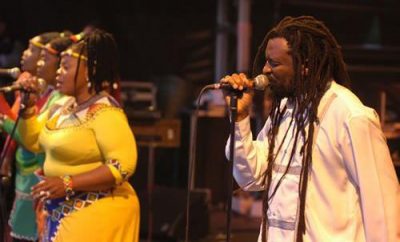
By
The fully air-conditioned bus carrying Lucky Dube, the famous South African born reggae star, his manager David Jacobs and the entire musical group arrived at the premises of the festival at Linkeroever-Antwerp.
There was another group playing on stage and Lucky had to perform after them. He arrived on time and sat in the bus for about thirty minutes. Suddenly he came down , wearing a grey leather cap, covering his dreadlocks, a pair of blue jeans and black shoes.
He went straight to the makeshift cafeteria and asked for some hot water. They couldn’t provide him. He was then directed to the next place. There he had one for his tea. I followed him humbly and said “Sir I have an appointment to interview you” “Who did you asked for the interview?” Asked Lucky Dube “Els please” I responded. Lucky identified the name immediately as the lady who has the program of all the artists performing at the festival that day, July 4. 2004. “I will do the interview after performing” Said Lucky and went back into the bus.

Joel Savage and Lucky Dube
I stood at the back of the stage for about thirty minutes and Lucky came out again. This time he had different attire on, signifying that it is time to go and do what he likes best: to put up a musical show. In a long sleeve light cotton black shirt and the same kind of material for trousers, I followed him as he walked towards the platform. Lucky didn’t walk straight there, instead grabbing one of the platform’s iron bars, holding it close and moving his body in gymnastically.
During the short period Lucky did that, my instinct told me that he was praying before going on stage. He did it in a way that nobody could see or barely understand what he was doing. As he climbed up stage, a thunderous scream of love, devotion and happiness greeted him. He grabbed the microphone and serious reggae business began. Lucky’s Peter Tosh style of voice was like a magnet pulling every one behind the stage to dance.

He sang a couple of his old songs like ‘Money Money Money‘ taken from the album ‘Soul Taker’, but things went differently when he sang ‘Different Colours, One People‘. The people were filled with mixed feelings of sadness and joy. I saw some weeping, swinging their hands in the air. Some carried bands with bold inscriptions “Lucky We Love You” “Lucky Dube welcome to Antwerp” etc. I have never seen this anywhere before.
Then he shifted to his latest album ‘The Other Side’, which was already on sale. He explained why he wrote the song ‘The Other Side‘: Part of the green grass is green and the other part is not. Many Africans in Europe today want to go home, while those in Africa want to come to Europe. After this he also played a tune called ‘Soldier‘, followed by ‘Kwasa-Kwasa’, his own infusion of reggae and Kwasa beats.
Lucky Dube put forward a spellbinding performance that won him an ovation at the Pole-Pole Festival. He retired to the bus later on and got changed. Fifteen minutes later, he came out and signed a lot of materials for some fans and gave them out. Also some had the chance to talk to the simple looking man, whose music had played an important role to the fall of apartheid ten years ago in the Republic of South Africa.
The Shocking Death Of Lucky Dube
Three years after interviewing Lucky Dube, news of his death shocked the world. It was something nobody expected to hear. Lucky had been shot. The impact of the news of his death hit me so hard that the first words I uttered were “How such a perfect gentleman, who wouldn’t harm anyone, could lose his life in such a tragic way?”
According to the Mail and Guardian newspapers, Lucky died instantly in a botched hijacking attempt, in Johannesburg on October 18, 2007. That was just two months after his 43rd birthday. The circumstances surrounding his murder illustrate how dangerous and violent crime in South Africa is escalating without control.
As a musician, Lucky gave us some of the most legendary reggae songs ever recorded. His music carries no violence. He called for peace, togetherness, love and respect for all mankind, yet this humble man died in this ‘Crazy World’, a song he wrote; song I will call a masterpiece.
As a father, Lucky was said to be one of the most charming, respected selfless and dedicated to have lived. He left behind his lovely wife and seven children, including a month old baby.
Joel Savage’s interview with Lucky can be read in his book, ‘The Passion of Reggae and African Music’, available here

Joel Savage
Joel Savage is a freelance writer who enjoys the challenges of creativity and adventure. He has written seven novels and is currently working on further projects. The writer, African-Belgian, is a member of the Flemish Journalists Association. He also writes for Diplomatic Aspects Newspaper and currently lives in Antwerp, Belgium, with his wife and three children.
His latest book ‘AIDS and Ebola’: The Greatest Crime in Medical History Against Mankind’ has recently been published and is available here.
Joel’s earlier books can be purchased here also.





No Comments Yet!
You can be first to comment this post!